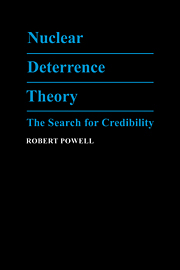Book contents
- Frontmatter
- Contents
- Preface
- 1 Introduction
- 2 The nuclear revolution and the problem of credibility
- 3 The dynamics of nuclear brinkmanship
- 4 Stability and longer brinkmanship crises
- 5 Crisis stability in the nuclear age
- 6 Stability and the lack of control
- 7 The strategy of limited retaliation
- 8 An appraisal
- Appendix Some introductory notes on game theory
- References
- Index
6 - Stability and the lack of control
Published online by Cambridge University Press: 13 October 2009
- Frontmatter
- Contents
- Preface
- 1 Introduction
- 2 The nuclear revolution and the problem of credibility
- 3 The dynamics of nuclear brinkmanship
- 4 Stability and longer brinkmanship crises
- 5 Crisis stability in the nuclear age
- 6 Stability and the lack of control
- 7 The strategy of limited retaliation
- 8 An appraisal
- Appendix Some introductory notes on game theory
- References
- Index
Summary
The strategy that leaves something to chance and brinkmanship appeal to a sanction that, it is assumed, would not be imposed deliberately. The problem, then, is to explain how threats that ultimately rely on such a sanction can be related to states' attempts to protect their interests. The preceding chapter began to move away from this assumption by discussing the dynamics of escalation when there is one situation in which the sanction will be imposed deliberately. This chapter describes the game-theoretic foundations underlying that discussion. This is done in two steps. The first is to define a large class of games. The games in this class are then shown to be completely stable, even though there are significant first-strike advantages. The probability of there being a general nuclear exchange in any game satisfying the conditions defining the class is zero. These conditions are sufficient to ensure stability.
Once sufficient conditions of this kind have been identified, it is natural to try to investigate the consequences of relaxing them. The first assumption to be relaxed will be the assumption that there are only two nuclear superpowers. Here it will be shown that if there are M superpowers, and if the threshold of inevitability needed to justify launching a first strike is larger than (M–1)/M, then the crisis will be completely stable.
- Type
- Chapter
- Information
- Nuclear Deterrence TheoryThe Search for Credibility, pp. 131 - 147Publisher: Cambridge University PressPrint publication year: 1990



